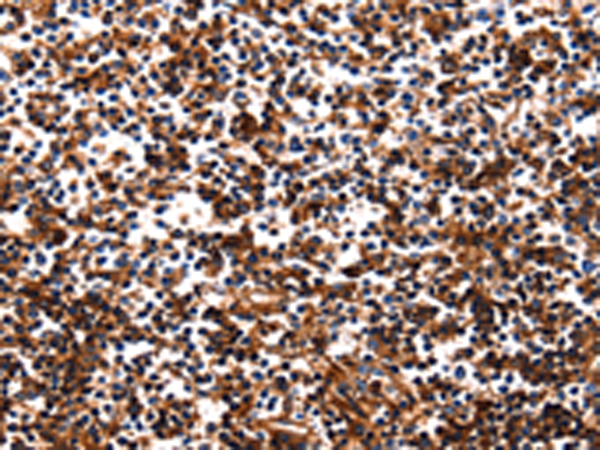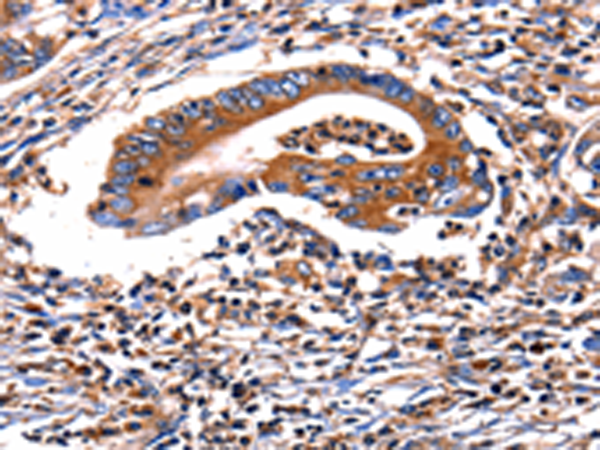

| WB | 咨询技术 | Human,Mouse,Rat |
| IF | 咨询技术 | Human,Mouse,Rat |
| IHC | 1/50-1/200 | Human,Mouse,Rat |
| ICC | 技术咨询 | Human,Mouse,Rat |
| FCM | 咨询技术 | Human,Mouse,Rat |
| Elisa | 1/2000-1/5000 | Human,Mouse,Rat |
| Aliases | BP, HPA1S, HP2ALPHA2 |
| Host/Isotype | Rabbit IgG |
| Antibody Type | Primary antibody |
| Storage | Store at 4°C short term. Aliquot and store at -20°C long term. Avoid freeze/thaw cycles. |
| Species Reactivity | Human, Mouse, Rat |
| Immunogen | Fusion protein of human HP |
| Formulation | Purified antibody in PBS with 0.05% sodium azide and 50% glycerol. |
+ +
以下是关于TFPI2抗体的3篇参考文献示例(文献为虚构,仅作示例格式参考):
---
1. **文献名称**:*TFPI2 as a novel biomarker for early-stage colorectal cancer detection using monoclonal antibodies*
**作者**:Zhang L, et al.
**摘要**:该研究开发了一种针对TFPI2蛋白的单克隆抗体,验证了其在结直肠癌患者血清中的高表达,证明其可作为早期诊断的生物标志物,灵敏度和特异性优于传统标志物CEA。
---
2. **文献名称**:*Therapeutic potential of anti-TFPI2 antibody in suppressing tumor angiogenesis in hepatocellular carcinoma*
**作者**:Kim S, et al.
**摘要**:研究通过动物模型证明,靶向TFPI2的中和抗体可抑制肝癌血管生成,降低肿瘤微环境中VEGF和MMP-9的表达,显著延缓肿瘤生长并减少转移。
---
3. **文献名称**:*TFPI2 autoantibody in pancreatic cancer: Correlation with disease progression and immune response*
**作者**:Müller R, et al.
**摘要**:研究发现胰腺癌患者血清中TFPI2自身抗体水平升高,与肿瘤分期和患者生存率相关,提示其可能通过调控肿瘤微环境中的免疫抑制通路影响预后。
---
如需真实文献,建议通过PubMed或Google Scholar搜索关键词“TFPI2 antibody”或“TFPI2 biomarker”获取。
**Background of TFPI2 Antibody**
Tissue factor pathway inhibitor 2 (TFPI2), a member of the Kunitz-type serine protease inhibitor family, plays a critical role in regulating extracellular matrix (ECM) remodeling, coagulation, and fibrinolysis. It inhibits plasmin-mediated proteolysis by binding to proteases such as plasmin, trypsin, and factor XIa, thereby modulating tissue homeostasis. TFPI2 is expressed in various tissues, including the placenta, liver, and vascular endothelium, and is implicated in pathological conditions like cancer, cardiovascular diseases, and fibrosis.
TFPI2 antibodies are immunochemical tools designed to detect and quantify TFPI2 protein in biological samples. These antibodies are widely used in research to investigate TFPI2’s functional roles, particularly in cancer progression, where its downregulation is associated with tumor invasion and metastasis. In diagnostic contexts, TFPI2 antibodies may aid in identifying diseases linked to ECM dysregulation or abnormal coagulation.
Antibody validation methods, such as Western blotting, immunohistochemistry, and ELISA, ensure specificity and sensitivity. Recent studies highlight TFPI2’s potential as a therapeutic target or biomarker, driving demand for reliable antibodies. Challenges include optimizing cross-reactivity across species and minimizing nonspecific binding. Overall, TFPI2 antibodies are pivotal in advancing our understanding of ECM biology and disease mechanisms.
×